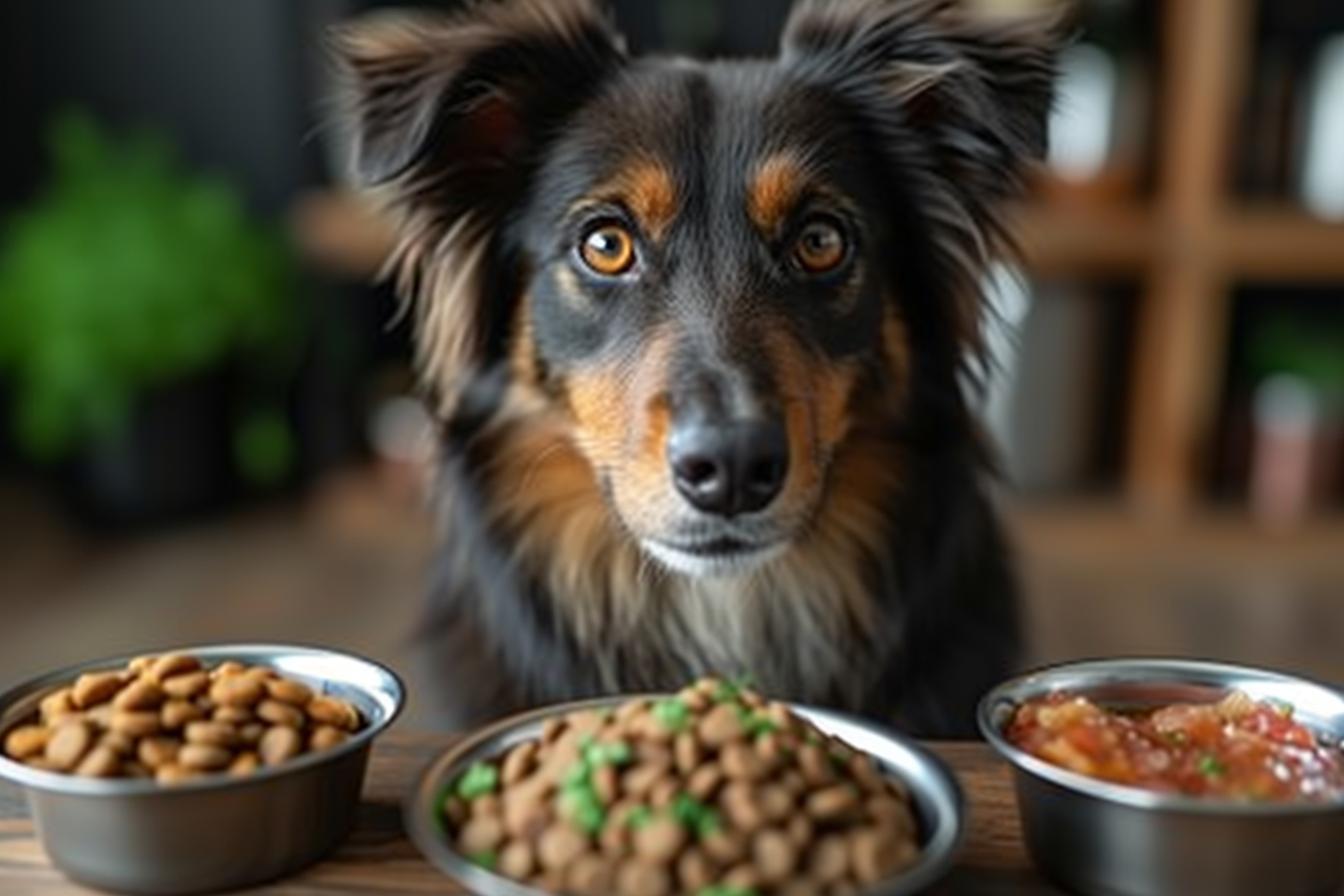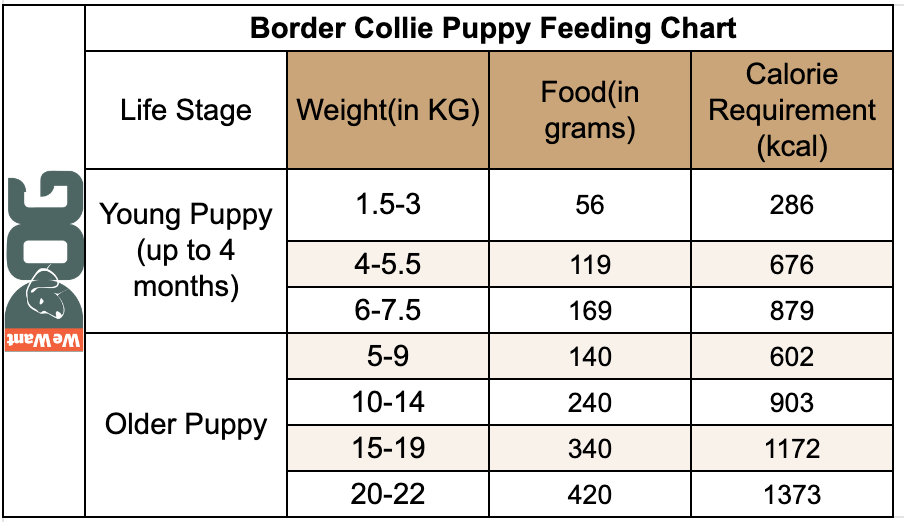Feeding a Border Collie puppy can be tricky. They need the right balance of nutrients to grow well.
Border Collie puppies are active and energetic. They require a specific diet to stay healthy. Knowing how much to feed them is crucial. Too much or too little can affect their growth. Puppies need more calories and nutrients than adult dogs.
Their diet must be balanced and nutritious. This ensures they develop strong bones, muscles, and a healthy coat. Proper feeding also helps with their energy levels and overall wellbeing. Understanding their dietary needs will help your puppy thrive. Let’s explore how much to feed your Border Collie puppy for optimal health.
Feeding Guidelines
Feeding your Border Collie puppy correctly ensures their healthy growth and development. Knowing the right amount and schedule can be tricky. Follow these guidelines to keep your puppy happy and healthy.
Portion Sizes
Proper portion sizes are crucial for your puppy’s growth. Overfeeding can lead to obesity, while underfeeding can stunt their growth. Here is a simple table to help you determine the right amount:
| Age (Months) | Portion Size (Cups per Day) |
|---|---|
| 2-3 | 1-1.5 |
| 4-5 | 1.5-2 |
| 6-12 | 2-2.5 |
Consult your vet for specific needs based on your puppy’s activity level.
Feeding Schedule
A consistent feeding schedule helps regulate your puppy’s metabolism. Puppies thrive on routine. Here is a recommended schedule:
- Morning: 7:00 AM
- Midday: 12:00 PM
- Afternoon: 5:00 PM
- Evening: 8:00 PM
Feed smaller, more frequent meals to avoid overloading their small stomachs. This schedule also helps with house training. Always provide fresh water alongside meals.
Stick to these guidelines to ensure your Border Collie puppy grows into a healthy and happy adult.
Nutritional Requirements
Feeding a Border Collie puppy involves understanding their unique nutritional requirements. These energetic puppies need the right nutrients to grow strong and stay healthy. This guide will help you ensure your pup gets a balanced diet.
Essential Nutrients
Border Collie puppies need several essential nutrients to thrive. Here are some key ones:
- Proteins: Vital for muscle growth and repair. Look for foods with chicken, beef, or fish.
- Fats: Provide energy and help absorb vitamins. Choose foods with healthy fats like fish oil.
- Carbohydrates: Offer energy and support digestion. Opt for whole grains or vegetables.
- Vitamins: Support overall health and development. Ensure the food contains vitamins A, D, E, and K.
- Minerals: Important for bone health and growth. Key minerals include calcium and phosphorus.
Balanced Diet
A balanced diet is crucial for your Border Collie puppy. Here’s how to achieve it:
- Choose high-quality commercial puppy food. Look for brands with natural ingredients.
- Check the label for a balance of proteins, fats, and carbohydrates.
- Ensure the food meets the AAFCO (Association of American Feed Control Officials) standards.
- Feed your puppy small, frequent meals. Puppies need more frequent feeding than adult dogs.
- Provide fresh water at all times. Hydration is key for overall health.
Consult your vet to tailor the diet to your puppy’s specific needs. Proper nutrition helps your Border Collie puppy grow into a healthy adult dog.
Age-based Feeding
Feeding a Border Collie puppy depends largely on their age. Nutritional needs change as puppies grow. This ensures they develop healthily and remain energetic. Below, you’ll find a guide to feeding newborns and older puppies.
Feeding Newborns
Newborn Border Collie puppies require special care. Initially, they rely on their mother’s milk. This provides essential nutrients for growth. For the first few weeks, feeding should be frequent. Here is a simple schedule:
| Age (Weeks) | Feeding Frequency |
|---|---|
| 0-2 | Every 2 hours |
| 2-4 | Every 3 hours |
| 4-6 | Every 4 hours |
At around 4 weeks, start introducing soft puppy food. Mix it with water to create a gruel. This helps them transition from milk to solid food.
Feeding Older Puppies
As Border Collie puppies grow, their feeding needs change. By 6 weeks, they can eat solid puppy food. Divide their meals into smaller portions. A recommended schedule is:
- 6-12 weeks: 4 meals per day
- 3-6 months: 3 meals per day
- 6-12 months: 2 meals per day
Choose high-quality puppy food. Ensure it has the right balance of protein, fat, and carbohydrates. Consult your vet for specific brand recommendations.
Monitor your puppy’s weight and adjust portions as needed. Overfeeding can lead to obesity, while underfeeding can stunt growth. Always provide fresh water.

Credit: www.hypropremium.com.au
Choosing The Right Food
Choosing the right food for your Border Collie puppy is crucial. Their diet impacts their growth, energy levels, and overall health. Whether you opt for commercial dog food or a homemade diet, it’s essential to ensure your puppy gets the necessary nutrients. Let’s explore the options available.
Commercial Dog Food
Commercial dog food is a popular choice for many puppy owners. It’s convenient and specially formulated to meet puppies’ nutritional needs. Look for high-quality brands with meat as the first ingredient. Avoid foods with too many fillers like corn and soy. Check the label for essential nutrients like protein, fats, and vitamins. Puppy-specific formulas are best, as they cater to a growing dog’s requirements.
Homemade Diet
A homemade diet can be a great option if done correctly. It allows you to control exactly what your puppy eats. Fresh meats, vegetables, and grains can provide a balanced diet. Consulting with a vet is important to ensure your puppy gets all the necessary nutrients. They can help you design a diet plan that includes the right vitamins and minerals. Avoid feeding your puppy human foods that are toxic to dogs, like chocolate and onions.
Monitoring Growth
Monitoring the growth of your Border Collie puppy is essential. This helps ensure they are healthy and developing properly. By tracking their weight and observing healthy growth indicators, you can provide the best care.
Weight Tracking
Regular weight checks are important. Use a reliable scale. Weigh your puppy weekly. Record these weights to monitor growth patterns.
A healthy Border Collie puppy should gain about 1-2 pounds per week. If you notice weight gain slowing down or speeding up, consult your vet.
| Age (weeks) | Average Weight (pounds) |
|---|---|
| 8 | 10-12 |
| 12 | 14-18 |
| 16 | 18-24 |
Healthy Growth Indicators
Look for signs of healthy growth. Your Border Collie puppy should be:
- Active and playful
- Eating regularly
- Having a shiny coat
- Developing muscle tone
If your puppy seems lethargic, has a dull coat, or shows poor appetite, these may be signs of health issues. Consult your vet if you notice these signs.
By monitoring weight and growth indicators, you can help your Border Collie puppy thrive.

Credit: www.lovelybordercollie.com
Common Feeding Mistakes
Feeding a Border Collie puppy requires careful attention. Mistakes in their diet can affect their growth and health. Recognizing common feeding mistakes can help you provide the best nutrition for your puppy.
Overfeeding
Overfeeding is a frequent mistake. Border Collie puppies are energetic, but their small bodies can only handle so much food. Excess food can lead to obesity, which impacts their joints and overall health. Here’s what to watch for:
- Always measure their food portions.
- Avoid giving too many treats.
- Ensure they get enough exercise daily.
Use a measuring cup to control portions. Follow the feeding guidelines on the puppy food bag. This helps maintain a healthy weight and avoids overfeeding.
Inadequate Nutrition
Inadequate nutrition is another common mistake. Border Collie puppies need a balanced diet for proper growth. Feeding them low-quality food or not enough nutrients can stunt their development. Consider these points:
- Choose high-quality puppy food.
- Ensure it has the right balance of protein, fat, and carbs.
- Avoid foods with fillers and artificial ingredients.
Look for puppy foods that list meat as the first ingredient. Avoid foods with too many grains. High-quality foods provide essential vitamins and minerals.
Here’s a simple table to help you understand the nutritional needs:
| Nutrient | Requirement |
|---|---|
| Protein | 22-32% |
| Fat | 8-20% |
| Carbohydrates | Less than 20% |
Monitoring their diet ensures they get the nutrients needed for growth. Regular vet check-ups can also help track their nutritional needs.
Special Dietary Needs
Border Collie puppies are active and intelligent, requiring special dietary needs. Their diet must be balanced and suited to their specific health conditions. Understanding their dietary requirements ensures they grow into healthy adult dogs.
Allergies And Sensitivities
Border Collie puppies can have food allergies and sensitivities. Common allergens include chicken, beef, dairy, and grains. Monitor your puppy for symptoms such as itching, vomiting, and diarrhea. If these occur, consult a veterinarian.
| Allergen | Symptoms |
|---|---|
| Chicken | Itching, Ear Infections |
| Beef | Diarrhea, Vomiting |
| Dairy | Gas, Loose Stools |
| Grains | Skin Rashes, Digestive Issues |
Veterinary Recommendations
Consulting with a veterinarian helps you determine the best diet. They can provide personalized feeding plans based on your puppy’s health. This ensures the puppy gets the right nutrients.
- Protein: Essential for muscle growth.
- Fats: Important for energy and coat health.
- Vitamins: Support overall development.
- Minerals: Strengthen bones and teeth.
Regular check-ups help you keep track of your puppy’s health. Adjust the diet based on the vet’s advice. Follow the vet’s guidance for a balanced and healthy diet.

Credit: www.feedingmydogbreed.com
Transitioning To Adult Food
Transitioning your Border Collie puppy to adult food is an important step. It ensures they get the right nutrition. Knowing when and how to make this switch can keep your puppy healthy and happy.
When To Transition
Border Collie puppies usually transition to adult food around 12 months. Some may need to switch sooner or later. It depends on their growth rate and energy levels. Always consult your vet before making changes.
How To Transition
Begin by mixing a small amount of adult food with their puppy food. Gradually increase the proportion of adult food over a week. Monitor your puppy for any signs of digestive upset. If they seem uncomfortable, slow down the transition process.
Ensure you choose a high-quality adult food. Look for one with balanced nutrients. Border Collies need protein and energy for their active lifestyle. Keep fresh water available at all times.
Frequently Asked Questions
How Much Food Does A Border Collie Puppy Need Daily?
A Border Collie puppy typically needs about 1. 5 to 2 cups of high-quality puppy food daily. This amount can vary based on age, weight, and activity level.
How Often Should I Feed My Border Collie Puppy?
Feed your Border Collie puppy three to four times a day. This helps with digestion and provides consistent energy throughout the day.
What Type Of Food Is Best For Border Collie Puppies?
High-quality, balanced puppy food with essential nutrients is best. Look for food rich in protein, healthy fats, and vitamins.
Can I Give Treats To My Border Collie Puppy?
Yes, but treats should be given in moderation. Ensure they are healthy, puppy-safe, and make up no more than 10% of their daily intake.
Conclusion
Feeding a Border Collie puppy requires careful attention and consistency. Stick to a routine. Monitor their weight and health regularly. Adjust portions as they grow. Consult your vet for personalized advice. Remember, quality food supports their energy and development. Healthy habits now ensure a happy, active dog later.
Keep your puppy’s needs in mind. Your Border Collie will thank you with love and loyalty.
